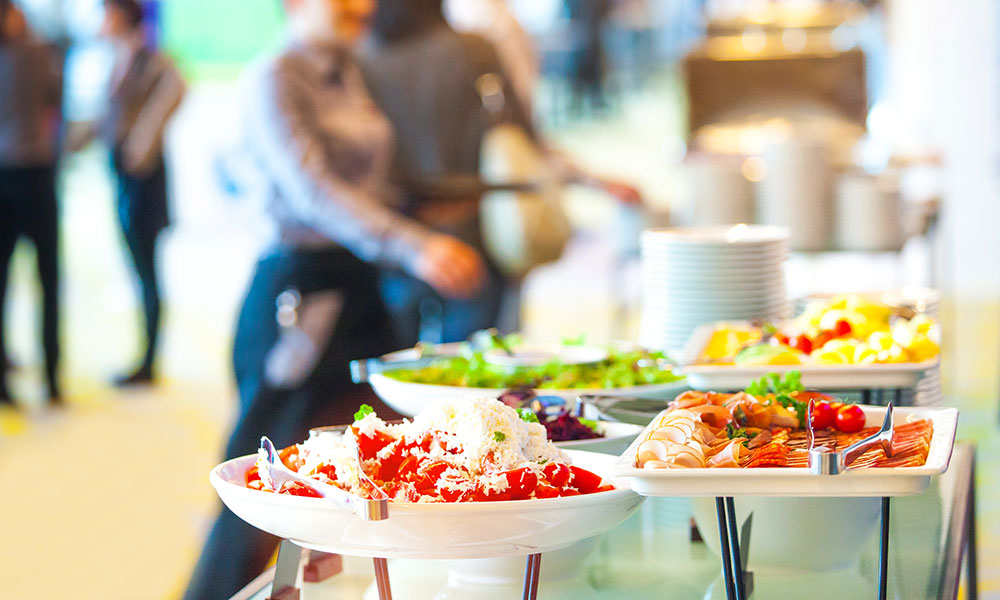
Attendees Are Looking for Healthy Options. How Are Venues Managing?
A new IACC survey on attendee nutrition and wellbeing trends reveals that venues are stepping up and making attendee dietary requests more of a priority.
A few months back, I was attending a conference, and I was on a desperate hunt for a piece of fruit. While muffins and sweets seemed to be everywhere, bananas and apples were nowhere to be found. Even though that chocolate croissant was tempting, I knew it would send me into a “carb coma” 30 minutes later. So, as soon as there was a break between sessions, I headed to the closest coffee shop and picked up a fresh fruit cup.
The nutritional needs of an audience are as diverse as the individuals who comprise it.
I’m not alone my quest for healthy options onsite. More attendees than ever are looking for healthier options when they’re at conferences and events—and venues are stepping up to address those requests and doing their part to make attendee health more of a priority.
That’s just one of the takeaways from the “Trends in Nutrition and Delegate Wellbeing” survey, which was released by IACC earlier this week.
“Due to a unique combination of delegate requirements, global health trends, and the digital transfer of knowledge—conference venues are transforming their menus, event space, and experience strategies to comply with these changes,” said the report.
The survey, which asked 75 venues worldwide to answer 24 questions about healthy choices available to attendees in terms of both food and beverage and event space, provided the following findings:
Venues recognize they need to take an active role in offering healthy options. All of the survey respondents said their properties consider attendee health and wellbeing when making design decisions. That may include creating communal interaction spaces or public areas that offer quiet reflection. More than three quarters (78 percent) also agreed that venues should be proactive in promoting healthy options to clients, rather than waiting for a client to ask. In addition, 55 percent of venues said they have changed their menus to cut back on less healthy options.
Venues are addressing attendee dietary and allergy restrictions—but can do better. Conference center menus are becoming increasingly aligned with growing requests from attendees for gluten-free, vegetarian, and vegan options. In the survey, 79 percent of respondents said they receive more dietary requests today than one or two years ago.
To help manage these restrictions, many venues ask attendees in advance about any special dietary needs or allergies. Ninety-six percent of venues surveyed said they address the issue of allergies with delegates. However, they also acknowledge areas for improvement. For example, 42 percent of venues surveyed have not developed a consistent, documented policy for managing guests with severe food allergies, and just 33 percent currently include basic nutritional information on their breakfast, lunch, and dinner menus.
“The fact that such a large number of venues are currently not offering nutritional information or allergen policies shows there is still much to be done,” said IACC CEO Mark Cooper.
Venues are offering brain-friendly conference break foods. Venues are seeing more planners and attendees ask for “brain food”—items that “deliver superior wellbeing benefits through increased nutrient or mineral contents.” Foods on that list include walnuts, blueberries, avocado, kale, and dark chocolate. Because of this, almost 88 percent of respondents said that have made changes to their break menus, and 38 percent said they offer “brain food” on their menus.
“Meeting professionals are also increasingly asking for continuous food breaks to fuel their attendees,” said Jessie States, CMM, manager of professional development at Meeting Professionals International, in the report. “The nutritional needs of an audience are as diverse as the individuals who comprise it. And people need the food that fuels them at a variety of different times. As organizers look to customize the onsite experiences of diverse audiences, food becomes a major player in the design of welcoming and inclusive experiences.”
As meeting planners, how do you work with venues to ensure healthy options are available for your conference attendees? Please share in the comments.
(sanjeri/iStock/Getty Images Plus)






Comments